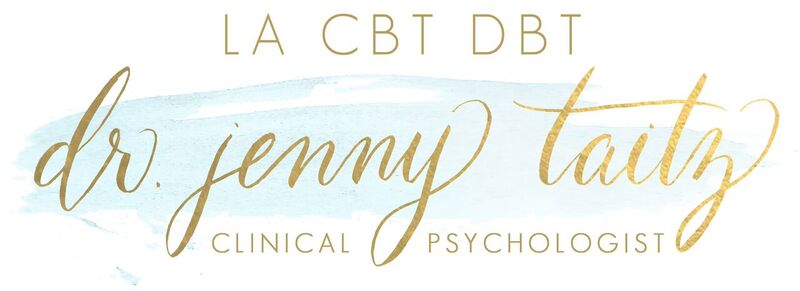TREATMENT PHILOSOPHY
![]()
Dr. Taitz has trained with the founders of ACT, DBT, MBCT, and MI. In her work, she weaves together both the philosophical underpinnings as well as practical exercises from the aforementioned treatments in order to guide people of all ages, with a wide range of difficulties, to cultivate a sense of wisdom and pursue effective behaviors.

-
COGNITIVE BEHAVIORAL THERAPY
(CBT), largely influenced by the work of Dr. Aaron Beck, focuses on changing the way you feel by modifying your thoughts and actions. Unlike traditional therapies where you spend a lot of time learning about your past, in CBT, you may notice how your past affects your situation, and develop practical tools to cope with the present. Research studies find that CBT is remarkably helpful in treating anxiety and mood disorders. CBT is collaborative— you identify what you would like to work on and together we understand how you came to face particular challenges, and develop practical strategies to move forward. The therapies outlined below are forms of CBT with specific aims.
-


-
ACCEPTANCE AND COMMITMENT THERAPY
(ACT) was developed by Drs. Steven Hayes, Kirk Strohsahl, and Kelly Wilson. ACT teaches you to become psychologically flexible, to let go of rigid patterns, and to build a life you choose, rather than a life based on avoiding or fighting feelings. ACT is about allowing yourself to experience negative emotions if they arise while moving towards what matters to you. Many unwanted experiences, including thoughts and feelings, can’t be controlled or avoided, but you can commit to actions that keep you living in line with your personal values. Like CBT and DBT, ACT has been researched extensively, and has been found remarkably helpful in treating a wide range of psychological issues, including pain management.
-
DIALECTICAL BEHAVIOR THERAPY
(DBT) was developed by Dr. Marsha Linehan to teach people how to manage emotions that feel overwhelming. Some people experience emotions more deeply than others. If you experience emotions intensely and have never been taught how to accept or attend to your feelings, you may find your emotions daunting. Dr. Linehan noticed pushing people to change wasn’t as effective as teaching people to both change and accept at the same time. This treatment synthesizes elements from both behavior therapy and Zen tradition. Initially, DBT was created to help individuals who engaged in self-harm and suicidal behavior due to emotional pain. Research studies comparing DBT to other reputable treatments found DBT to also be helpful in treating individuals who struggle with a wide range of issues such as emotion regulation, binge eating, bulimia, and older adults with depression. In her clinical practice, Dr. Taitz teaches elements from DBT when appropriate even to people who do not struggle with notable difficulties with emotions though want to live more effectively and they invariably remark on how beneficial they find DBT skills.
Briefly, DBT skills include the following:- Mindfulness– a “core” DBT skill, mindfulness involves being in the moment and learning to think non- judgmentally in order to live your life on purpose.
- Emotion Regulation– skills to help you understand emotions and improve your ability to gain distance and change emotions so you don’t feel enslaved by them.
- Distress Tolerance– tools to help you manage intense emotions and crises without making your problems worse.
- Interpersonal Effectiveness– strategies to assert yourself, maintain self-respect, improve your relationships, and manage anger.

-
MINDFULNESS BASED COGNITIVE THERAPY
(MBCT) was created by Drs. Zindel Segal, Mark Williams, and John Teasdale. The treatment is strongly influenced by Jon Kabat-Zinn’s Mindfulness Based Stress Reduction Program and teaches people to practice mindfulness to get out of repetitive, distressing, mental loops that are common in people who struggle with depression. After completing MBCT treatment, participants drastically reduce their risk of falling back into an episode of depression. You may think of mindfulness as a form of preventative medicine that anchors you. .

-
MOTIVATIONAL INTERVIEWING
(MI) describes a treatment approach developed by Drs. William Miller and Stephen Rollnick. When a person feels ambivalent, a MI approach amplifies a person’s motivation to change. Often hearing you “need to change” moves you to feel stuck. In MI, with the help of eliciting questions and a therapy relationship that honors your right to make your own decisions, you feel more driven to take steps and plan important life changes.

